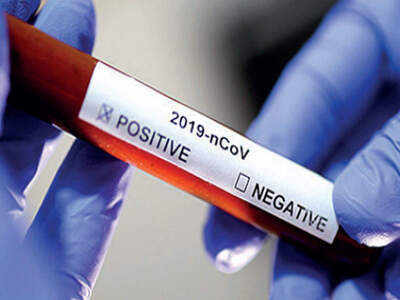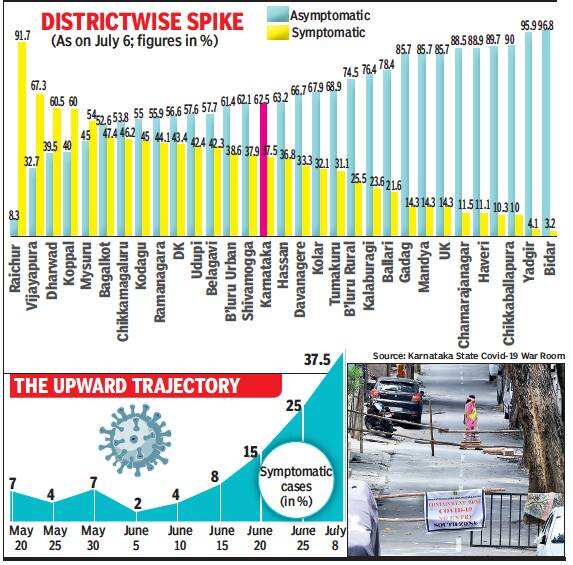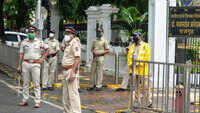
BENGALURU: There’s shift in the battle against Covid-19 in Karnataka with the number of symptomatic cases increasing over the past two weeks. Till Tuesday, symptomatic cases comprised 37.5% of overall positive cases as against 2% recorded just over a month ago.
The change comes as a breather for the government which has come under the scanner for its scattershot strategies that have failed tp plateau the number of cases. Unlike asymptomatic persons who could be silently transmitting the virus to others, those with symptoms (symptomatic) head straight to hospital or isolate themselves and don’t spread the virus.

While symptomatic cases in the state were a meagre 2% of overall positive cases reported till June 5, they increased to 15% on June 20 and touched 37.5% on July 7. Though some argue that an increase in symptomatic cases when testing is low may not be a correct marker to assess the virus spread, the government claims that an increase in symptomatic cases will not overwhelm the health infrastructure as only the seriously ill will seek medical help.
Medical education minister (in-charge of Covid issues) K Sudhakar told TOI: “It is definitely a positive development as patients are voluntarily reporting and getting the swab test done early and thereby getting quarantined sooner. If we look at the pattern of cases this month, there are more patients coming to hospitals with symptoms like headache, throat discomfort, loss of taste and smell instead of taking over-the-counter medication.”
He pointed out that the state’s testing capacity is being ramped up. “If more number of people with symptoms are reporting and getting tested, it’s a good sign that people have become aware of the pandemic and not scared to get tested,” he added.
Why are the symptomatic cases increasing by the day? Dr Giridhara R Babu, epidemiologist and member of ICMR’s Covid-19 taskforce group on research and surveillance, said: “Tthe virus or illness or severity of infection has not changed suddenly. This only means that symptomatic cases are mostly likely to get tested and diagnosed to have Covid-19”.
He added: “Earlier, contact tracing was strict resulting in several asymptomatic contacts testing positive. This was possible earlier due to the low burden. We are now increasingly testing Influenza Like Illness (ILI) and Severe Acute Respiratory Infection (SARI) patients, who, to start with, are symptomatic. At this stage of the epidemic, we need to increase the frequency of ILI survey and isolate everyone tested positive. Concurrent contact tracing and quarantine will decelerate the spread.”
Doctors also point out that changes in testing protocols could have triggered a decline in the number of asymptomatic cases. “Most asymptomatic patients were inter-state returnees. Now, as per the government testing protocol, not all inter-state returnees are getting tested and they will be tested only if they develop symptoms,” Dr Manohar KN, consultant physician, Manipal Hospitals, said, adding that the virus could be losing its potency.
Dr Manjunath CN, nodal officer, labs and testing, Covid-19 taskforce, also feels the increase in symptomatic cases is a good development. “When there are symptoms, patients seek medical help immediately and they get isolated. Hence, the spread of the virus gets restricted. Seeking early medical intervention is the best,” he said.
The change comes as a breather for the government which has come under the scanner for its scattershot strategies that have failed tp plateau the number of cases. Unlike asymptomatic persons who could be silently transmitting the virus to others, those with symptoms (symptomatic) head straight to hospital or isolate themselves and don’t spread the virus.

While symptomatic cases in the state were a meagre 2% of overall positive cases reported till June 5, they increased to 15% on June 20 and touched 37.5% on July 7. Though some argue that an increase in symptomatic cases when testing is low may not be a correct marker to assess the virus spread, the government claims that an increase in symptomatic cases will not overwhelm the health infrastructure as only the seriously ill will seek medical help.
Medical education minister (in-charge of Covid issues) K Sudhakar told TOI: “It is definitely a positive development as patients are voluntarily reporting and getting the swab test done early and thereby getting quarantined sooner. If we look at the pattern of cases this month, there are more patients coming to hospitals with symptoms like headache, throat discomfort, loss of taste and smell instead of taking over-the-counter medication.”
He pointed out that the state’s testing capacity is being ramped up. “If more number of people with symptoms are reporting and getting tested, it’s a good sign that people have become aware of the pandemic and not scared to get tested,” he added.
Why are the symptomatic cases increasing by the day? Dr Giridhara R Babu, epidemiologist and member of ICMR’s Covid-19 taskforce group on research and surveillance, said: “Tthe virus or illness or severity of infection has not changed suddenly. This only means that symptomatic cases are mostly likely to get tested and diagnosed to have Covid-19”.
He added: “Earlier, contact tracing was strict resulting in several asymptomatic contacts testing positive. This was possible earlier due to the low burden. We are now increasingly testing Influenza Like Illness (ILI) and Severe Acute Respiratory Infection (SARI) patients, who, to start with, are symptomatic. At this stage of the epidemic, we need to increase the frequency of ILI survey and isolate everyone tested positive. Concurrent contact tracing and quarantine will decelerate the spread.”
Doctors also point out that changes in testing protocols could have triggered a decline in the number of asymptomatic cases. “Most asymptomatic patients were inter-state returnees. Now, as per the government testing protocol, not all inter-state returnees are getting tested and they will be tested only if they develop symptoms,” Dr Manohar KN, consultant physician, Manipal Hospitals, said, adding that the virus could be losing its potency.
Dr Manjunath CN, nodal officer, labs and testing, Covid-19 taskforce, also feels the increase in symptomatic cases is a good development. “When there are symptoms, patients seek medical help immediately and they get isolated. Hence, the spread of the virus gets restricted. Seeking early medical intervention is the best,” he said.

Coronavirus outbreak
Trending Topics
LATEST VIDEOS
More from TOI
Navbharat Times
Featured Today in Travel
Get the app









